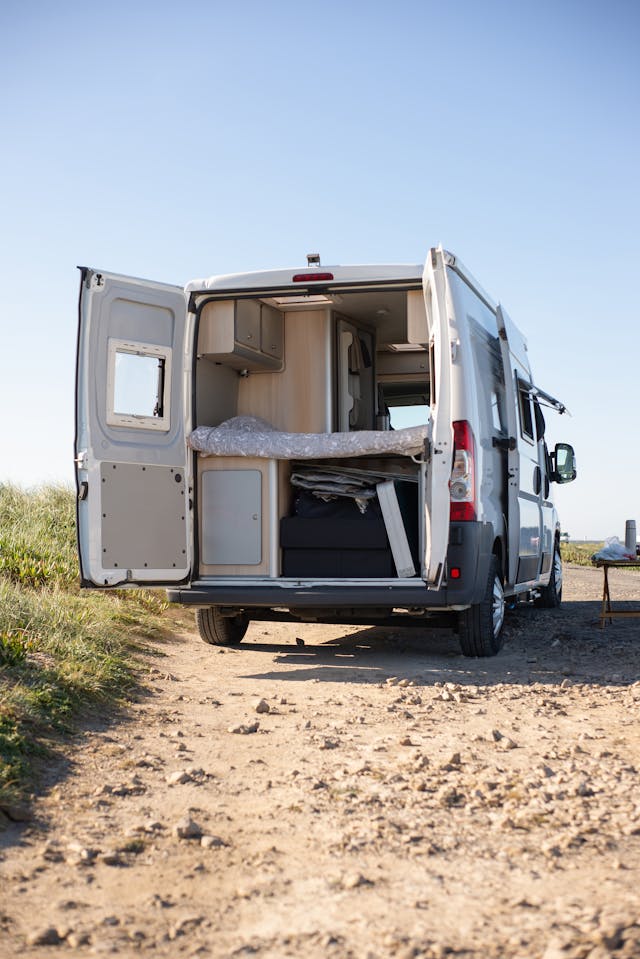Trailer tires can last for many memorable RV journeys. While they may appear in good condition on the outside, the internal condition might differ. Here’s what you’ll discover about when to replace your RV trailer tires:
- The impact of driving distance on the aging of trailer tires
- Why trailers left stationary for extended periods may require new tires
- A simple method to determine the age of your trailer tires
- The importance of proper inflation for trailer tire safety
- Tips on selecting the appropriate trailer tire
Two Factors Primarily Determine The Lifespan of RV Trailer Tires
When it comes to tires, two main considerations are tread wear and tire aging.
- If you drive between 10,000 to 15,000 miles annually, the tread may wear out in less than five years before the tires reach their lifespan.
- Conversely, if your annual mileage is 5,000 miles or fewer, you should focus more on the aging of the tires rather than tread wear.
Aging tires often exhibit visible sidewall cracks. However, these cracks aren’t always external; some may be hidden inside the tire. Internal cracks can lead to the separation of the steel belts, potentially causing loss of control over your trailer while driving.
Even if a trailer remains stationary for four years, the tires continue to deteriorate. Therefore, it’s recommended to replace all RV trailer tires within a five-year period, regardless of the mileage.
Checking Your Trailer Tire Age
You’re aware that RV tires typically need replacement every four or five years. However, determining how long the tires sat in the shop before purchase might be a challenge. Fortunately, there’s a straightforward method to find out.
Tire manufacturers imprint production dates on the sidewalls. To ascertain the age of your tires:
- Locate the DOT letters on all your trailer tires, including the spare.
- Exclude the following four-letter/number sequence.
- The subsequent code represents the date code.
- Note down this date code and input it into CheckTire. This will display the manufacturer and reveal the actual age of your tires.
Preventing Trailer Tire Deterioration
Tires can deteriorate due to heat, inadequate maintenance, and ultraviolet (UV) light, which induces chemical alterations in the rubber. Similar to how hoses and belts in vehicles can experience dry rot, tires exposed to extreme heat and under-inflation can also develop this issue. Infrequent use can hasten this deterioration process. Signs of dry rot may include discoloration and cracks on the tire sidewalls.
How to Slow Down RV Tire Aging
- Avoid over-washing as it can remove protective chemicals intended to slow tire aging.
- Prevent your tires from sitting unused for extended periods.
- Keep your spare trailer tire covered to minimize exposure to ultraviolet light and reduce the risk of dry rot.
- Opt for quality tire cleaning products over cheap alternatives. Many inexpensive products contain petrochemicals and silicone that can strip away the protective chemicals applied by the manufacturer to slow aging. Water-based tire products are a more suitable choice for maintaining your tires.
The Importance of Proper PSI for RV Tires
RV trailer tires are engineered with robust sidewalls to bear heavy loads, necessitating precise inflation levels. Under-inflation can lead to increased heat generation while driving, heightening the risk of tire failure.
Ensuring correct inflation is paramount for RV trailer tires. Maintaining the recommended PSI not only mitigates the risk of blowouts but also enhances fuel efficiency and slows down tire aging. Before embarking on any journey, make it a habit to check tire pressure using a pressure gauge.
The maximum PSI for your RV trailer tires is indicated on the tire sidewalls.
Investing in RV tire pressure monitoring systems (TPMS) is highly advisable. These systems alert you to underinflation issues, bolstering safety and reducing the chances of tire failure during transit. Many insurance providers even offer discounts to TPMS owners.
To preserve tire condition, winterize them along with the rest of your camper:
- Inflate tires to the correct pressure and cover them to shield from ultraviolet light exposure.
- When parking on asphalt, place a piece of wood beneath the tires to prevent contact with harmful petrochemicals. Likewise, avoid parking on frozen ground, as it can also be detrimental to tires.
- Ensure tires do not overlap the ends of the wood pieces, as this could potentially damage the tire interior.
Extend the lifespan of your RV trailer tires by maintaining proper balance. Unbalanced tires can develop wear spots on the tread sides, which may be less visible on the inner side of the tire.
The Significance of Proper Weight Load for Trailer Tires
To maximize the safety and longevity of your tires, it’s crucial not to exceed their weight capacity. Overloading can lead to tire blowouts and premature wear. Check the sidewall for the load range letter, typically denoted by a letter from A through N. Refer to charts available at tire shops to determine the weight capacity corresponding to this letter. Take note of the load range letter on your trailer tire sidewall upon purchase, and never downgrade to a tire with a lower load-bearing capacity.

